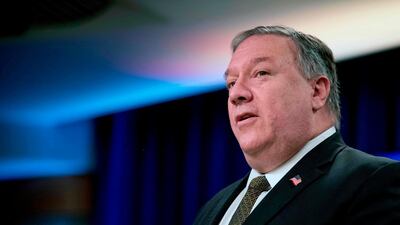US Secretary of State Mike Pompeo met China's top diplomat, Yang Jiechi, in Hawaii on Wednesday, the State Department said, amid a deterioration of relations between the world's two top economies.
The two have been in dispute over the handling of the coronavirus pandemic and China's move to impose new security legislation on Hong Kong, which bans criticism of the Chinese government.
Tension has also risen also over China's neighbour North Korea, whose nuclear weapons programme have the US and China concerned.
Earlier on Wednesday, foreign ministers of the G7 countries, including Mr Pompeo, issued a statement calling on China to withdraw with the Hong Kong legislation.
The US secretary has been forceful in his criticism of Beijing and it was his first known contact with Mr Yang since they discussed the coronavirus by phone on April 15.'
They had not met face to face since last year.

Experts say US-China relations have reached their lowest point in years.
In mid-May, US President Donald Trump, who has pursued a deal to end a damaging trade war he launched with China, even suggested he could cut ties with Beijing.
Mr Trump and his administration have stepped up their speech against China in the run-up to the November US election.
But his former national security adviser, John Bolton, said on Wednesday that Mr Trump sought Chinese President Xi Jinping's help to win re-election during a closed-door meeting in June 2019.
Mr Bolton's accusations are part of a book that the US government on Tuesday sued to block him from publishing, saying it contained classified information and would compromise national security.
The White House did not immediately respond to a request for comment on excerpts published in major US newspapers on Wednesday.
China and the US did not outline an agenda for the Hawaii talks, but diplomats and other sources have said the meeting was requested by Beijing.
US trade representative Robert Lighthizer told a congressional hearing that Chinese officials had repeatedly affirmed their commitment to buy more US goods and services.
The commitment was part of a Phase 1 trade deal signed in January and about $10 billion (Dh36.73bn) in purchases has been so far recorded.
Mr Pompeo has said that China could have prevented hundreds of thousands of deaths from the coronavirus pandemic by being more transparent, and accused it of refusing to share information.
Mr Trump has initiated a process of eliminating special US treatment for Hong Kong to punish China for curbing freedom there.
But he has stopped short of immediately ending privileges that have helped the territory to remain a global financial centre.

